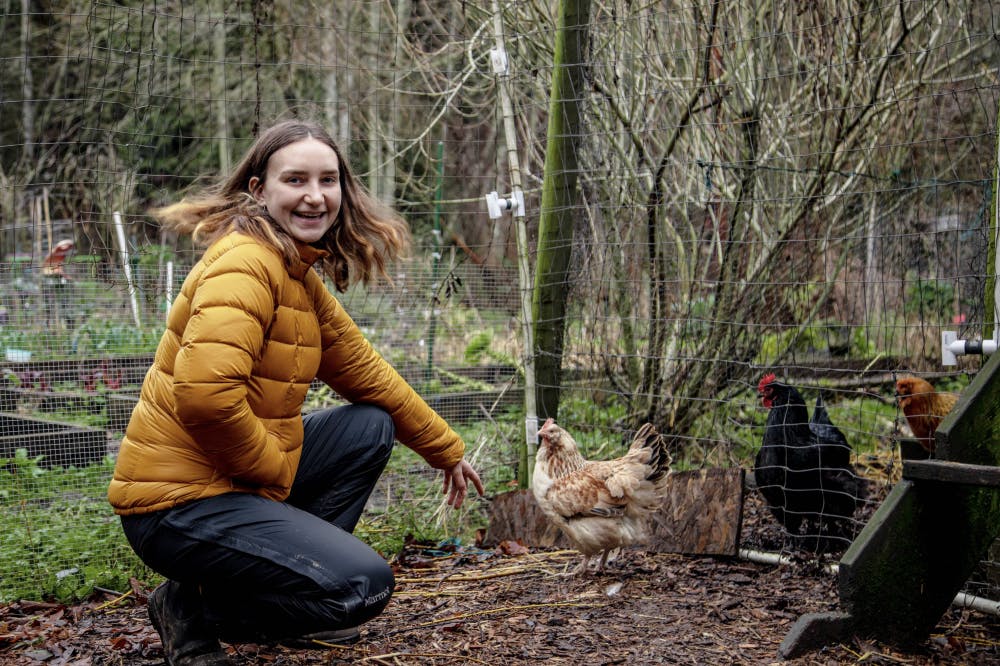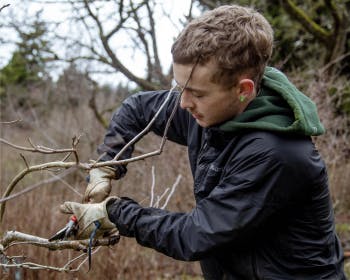The Associated Students Outback Farm does not rest for the winter. In fact, Outback employees say the farm is as active and lively in the colder months as it is in the warmer months. From work parties to preparing the farm for the next year, there is a plethora of tasks that need to be fulfilled to ensure the farm is successful in 2020.
Sage Fairman, operations coordinator at The Outback, has been working to not only winterize the farm, but also maintain and improve its structural integrity. The paths are covered with mulch to improve accessibility, and holes are strategically dug to improve drainage. Accessibility and drainage are vital for the farm’s success during the rainy months.
Fairman not only works on the maintenance of the farm’s structure, but also with tending to the chickens. Making sure to winterize the chicken coop is vital for their comfort and survival.
“It’s better to leave them outside, because if we were to bring them inside they would have to adjust back to the cold temperatures,” Fairman said. “They’re hardy birds.”
While Fairman tends to her chickens, Edward Johnson, AS Forest Garden & Native Habitats assistant coordinator for The Outback, can be found pruning the fruit trees. Pruning is another vital part of winter maintenance at The Outback.
Cutting and shaping the trees in the winter allows their shape to be manipulated as they grow during the warmer months. Johnson explained that by manipulating the growth of the trees, they are able to grow in shapes that will be more conducive to their health and ability to be harvested.
“If you want to get the most fruit out of a tree, you need to make sure there are enough branches reaching outward to reach the sun, as opposed to the branches growing inward,” Fairman said.
Johnson will be hosting a pruning workshop Wednesday, Jan. 29 from 12 -4 p.m. at The Outback where he will share his knowledge of the topic and help students learn how and why trees are pruned.
The Outback also begins preparation for spring by planting some crops in the greenhouse and others that will spend winter underground in the garden beds. Fairman explained that some crops, such as garlic, are planted in fall and grow underground all winter. This allows the garlic to absorb as many nutrients as possible from the soil, increasing the flavor as well. To help protect the winter crops from the cold temperatures, straw is placed on top of the garden beds to insulate the heat.
“Winter is an extremely important time because we handle some of the maintenance on the farm and do a lot of preparation for the year ahead,” Terri Kempton, manager of the farm, said.
Some of the preparation includes taking care of plants that start in the greenhouse and get transplanted outside when it gets warmer Kempton explained.
“I love being able to see the skeleton of the farm,” Kempton said. “In the summertime, it’s so lush and there is foliage everywhere, but in winter you can see the structure of what's happening and the shape of what’s going on. I also enjoy the quietude. It’s a great time to get outside and connect with the seasons and pay attention to what flourishes during the winter.”
The Outback is a great excuse to get outside even when its cold and windy, said some of the workers on the farm. “That’s part of where we live,” Kempton said. “Connecting to the environment in the colder months makes coming out in the spring and summer even more rewarding because they are able to see the changes. It helps sustain us as humans. We ride that wave of regrowth and regeneration.”
Despite this, working on a farm in the cold and rain is not everyone's cup of tea. To help students stay warm and dry while remaining involved with the farm, Rebecca Williams, AS Outback coordinator, has focused her energy on implementing indoor activities and workshops.
These events are geared toward educating students and building skills that can be utilized when spring arrives. In addition to education and community outreach, Williams aims to make community involvement accessible to a large variety of people.
Starting Feb. 1 and until Feb. 18, The Outback will be hosting a food and coat drive. All proceeds will be going to either the food pantry on campus or the Bellingham Food Bank. Additionally, a permaculture workshop will be held on February 20 at 4:30 p.m. in partnership with Inspire Farms.








